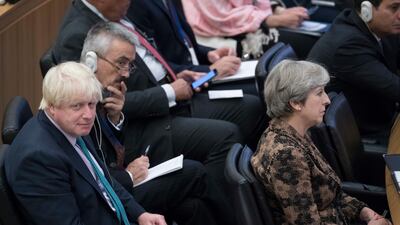To an unusual degree the persona of Boris Johnson, the British foreign secretary, was a product of the journalists' union. This week his Praetorian guard turned on one of their own.
Mr Johnson attended a cabinet meeting on Thursday after Theresa May ordered her wayward colleague to leave the annual United Nations General Assembly meeting early.
Instead of presiding over a Security Council debate on tackling ISIL crimes in Iraq, Mr Johnson endured an overnight flight on the prime minister’s plane. Adam Boulton, the Sky News political presenter, reported there was no attempt at common ground on the flight. Mrs May went to sleep, steeling herself for what would be a three-hour cabinet discussion of her Brexit address in Florence.
Marooned in the grandeur of the Foreign Office, a department that despite its name has been quarantined from the Brexit process, Mr Johnson had been off the main political radar since his failed Conservative party leadership bid last year.
That changed when he wrote a 4,200-word article in the Daily Telegraph last weekend that set out the case for an idealistic Brexit, not one dominated by the minutiae of budget contributions and torturous trade talks.
The newspaper made the article into a campaign. No fewer than half a dozen articles were published within hours supporting Mr Johnson’s spirited intervention.
Cabinet colleagues however reacted with fury. Amber Rudd, the home secretary and a fellow holder of one of the great offices of state, accused him of “backseat driving”. She also pointed out that the nation was coping with the Parsons Green terror attack on Friday, the day the long article was written.
“I had a very busy weekend dealing with what could have been a terrible attack on our public transport,” she said.
Mr Johnson may have thought he was distancing himself from the fray by flying to New York. Instead he was throwing himself into a maelstrom that played out on Manhattan’s Lexington Avenue. A morning jog turned into an ambush in the hotel doors. Pressed on resignation, he sweatily proclaimed unity with Mrs May, claiming they were a “nest of singing birds”.
An attempt to do a pool interview with one reporter saw him claw at his hair like a cornered beast. “Do you enjoy being foreign secretary, Boris?” elicited a stuttering reply. The follow-up amounted to a humiliation. “Will you miss it?”
The joke that with Mr Johnson is never far away failed to come. As former Brussels correspondent and magazine editor, Mr Johnson enjoys a camaraderie with reporters that other ex-journalists in the cabinet, such as Michael Gove, do not.
_______________________________________
Read more:
Boris Johnson: the political soap opera that keeps on giving
Tory MPs call for Boris Johnson’s head after breach of party unity
UK employers most downbeat since Brexit vote
________________________________________
Some former colleagues have called him out, notably Martin Fletcher, an ex-assistant editor of the Times, who claims Mr Johnson's distorted coverage of Brussels was instrumental in alienating Britain from the European Union.
"Mr Johnson, fired from The Times in 1988 for fabricating a quotation, made his name in Brussels not with honest reporting but with extreme euroscepticism, tirelessly attacking, mocking and denigrating the European Union," he wrote last year. "Mr Johnson may be witty and amusing, but he is extremely dangerous. What began as a bit of a joke could inflict terrible damage on his country."
The Florence speech is being seen as an attempt to break the deadlock in negotiations, which have stalled over issues such as the “divorce bill”, the rights of European citizens in the UK and the role of the EU courts.
Brussels is hoping Mrs May will end the logjam with an offer on the financial settlement it says Britain owes for its departure from the bloc.
The Financial Times reported this week that she may be willing to offer a sum of around €20 billion (Dh87.5bn), which would be well below the roughly €60bn that Brussels is said to be seeking.


